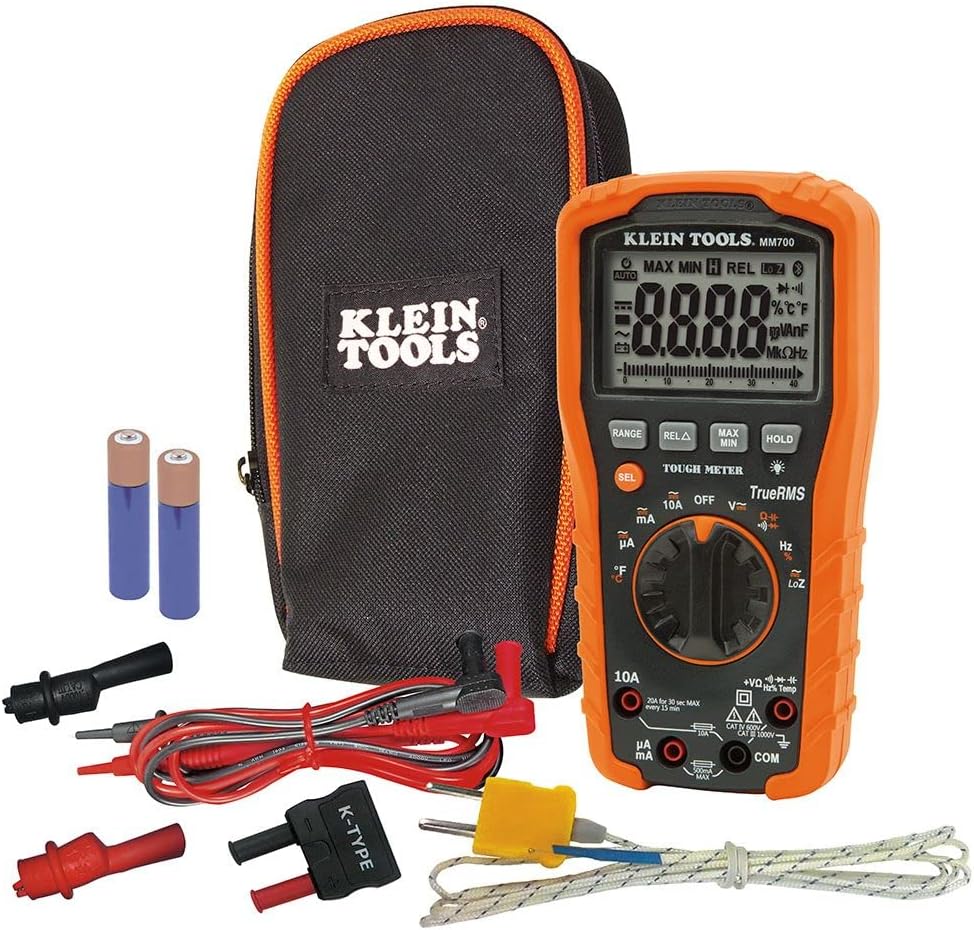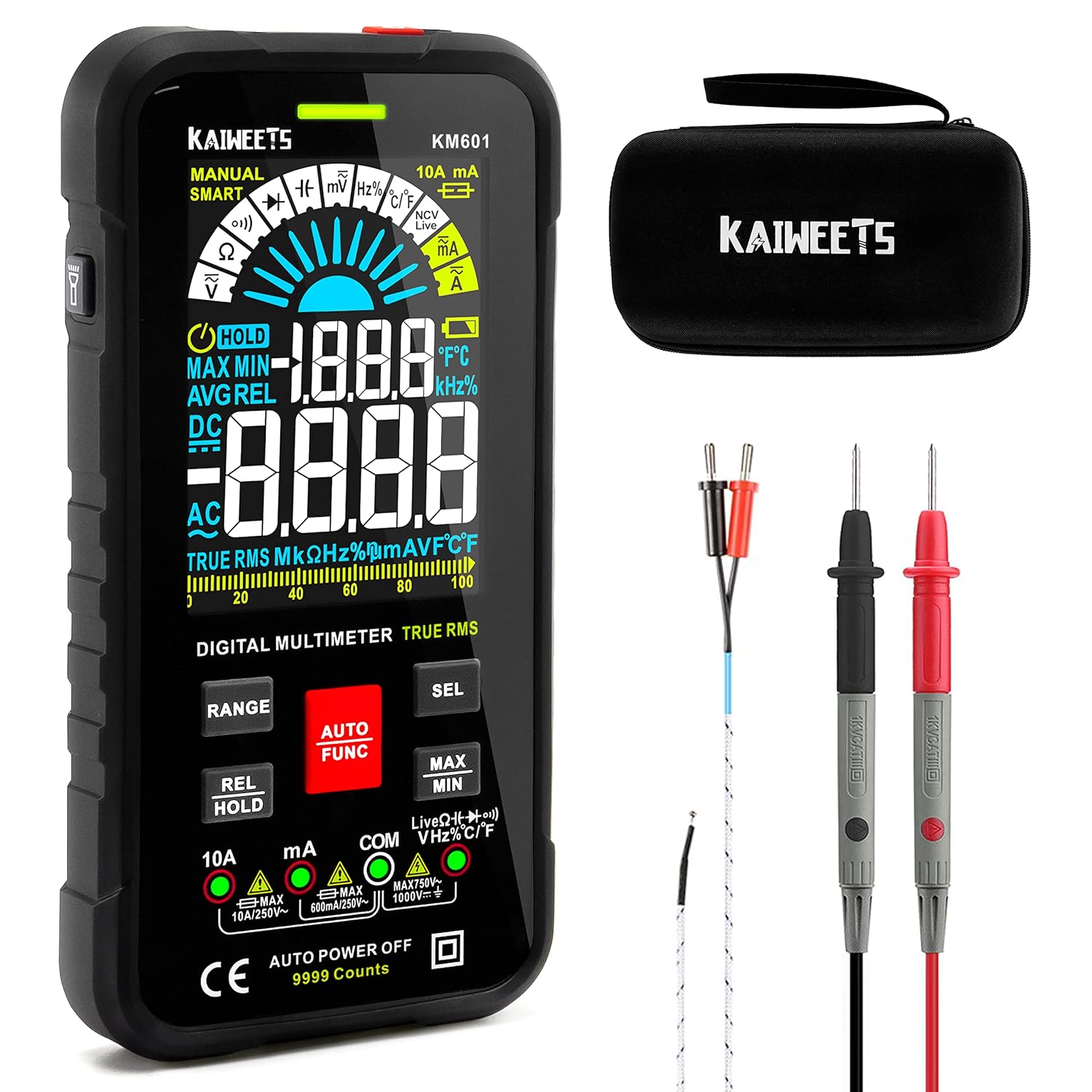Are you an electronics hobbyist looking for the best multimeter on the market? I’ll explain exactly what a multimeter is, why it is so essential for any electronic enthusiast, and which are considered the top 5 best multimeter for electronics hobbyist.
If you want to have a good mulitmeter for DIY electronics work, then I have discussed 5 best multimeters for DIY electronics work in another blog.
This way, you can ensure that your next purchase will be appropriate for your needs and allow you to stay up-to-date with your projects. So let’s get started – read on to learn more about these unique devices and how they can help take your electronics work even further.
Comparison Table for Best Electronics Multimeters
5 Best Multimeter For Electronics Hobbyist
1. Fluke 287 True-RMS Multimeter-Best Multimeter For Circuit Designing
Working with electrical wiring and components requires precision and accuracy. That is why professionals use the Fluke 287 True-RMS Electronics Logging Multimeter. It provides a range of measurements such as voltage, current, resistance, frequency, capacitance, temperature, conductance, pulse width, and duty cycle.
Its European Conformity (CE) marking combined with UL, CSA, and IEC 61010 safety standards certifications is perfect for working with Category I installations up to 1000V. In addition, the Fluke 287 True-RMS Electronics Logging Multimeter ensures that you get reliable and accurate readings each time.
Read more about How Much Does a Multimeter Cost?
Specifications
- Display Counts: 50000
- Auto/Manual ranging: Yes
- AC/DC Voltage measuring range: 1000V
- AC/DC Current measuring range: 10A
- Resistance: 500 MΩ
- Frequency: 99.9 Hz to 999.99 kHz
- Capacitance: 50,000 µF
Pros:
- Improve safety
- Increase productivity
- Enhance collaboration
- Easy to read
Cons:
- Hard time locking on to Type G
Why Do You Choose?
Due to its accuracy and reliability, you chose a Fluke 287 multimeter. Providing precise measurements, it is ideal for my work as a multimeter technician. Moreover, its durable construction makes it a dependable and long-lasting tool for electrical testing that can withstand the demands of my job.
2. Klein Tools MM700 Multimeter– Best Budget Multimeter For Electronics Hobbyist
If you’re looking for an incredibly reliable and accurate multimeter, look no further than the Klein Tools MM700. Not only does it have an automatic ranging true root mean square (TRMS) technology for increased accuracy, but it also comes equipped with many other features that make it a great addition to your tool belt.
There’s a low impedance (LoZ) mode for identifying and eliminating ghost or stray voltages, a low battery indicator, and an easily accessible battery and fuse replacement compartment.
Read more about Comparison Klein MM600 vs MM700- Which one is the Best?
Specifications
- Display Counts: 4000
- Auto/Manual ranging: Yes
- AC/DC Voltage measuring range: 1000V
- AC/DC Current measuring range: 10A
- Resistance: 40MOhms
- Frequency: 1 Hz-500 kHz
- Capacitance: 4000µF
Pros:
- Built to withstand
- Low battery indicator
- Easily accessible battery
- Automatic ranging
Cons:
- Test leads are not standard
Why Do You Choose?
The Klein Tools MM700 Multimeter offers precision, durability, and reliability for accurate electrical measurements. For professional technicians, its rugged design and wide range of functions make it a top choice.
3. Fluke 179 Digital Multimeter – Best Multimeter For On the Go!
Need a reliable, full-featured digital multimeter for your electrical troubleshooting needs? Look no further – the Fluke 179 Digital Multimeter Kit covers you.
To top it all off, its durable carrying case makes taking this entire kit easy. And with advanced electronics functions and up-to-date safety standards, there’s no compromise in quality. This multi-tool will make tackling any issue fast, safe, and efficient.
Read more about Best Budget Multimeter Reviews
Specifications
- Display Counts: 6000
- Auto/Manual ranging: Yes
- AC/DC Voltage measuring range: 1000V
- AC/DC Current measuring range: 10A
- Resistance: 50 MΩ
- Frequency: 100 kHz
- Capacitance: 10,000 μF
Pros
- Both manual and automatic ranging
- Large backlit digital display
- Includes an analog bar graph
- Provide accurate measurements
Cons
- The carrying case is not much appealing
Why Do You Choose?
The Fluke 179 Digital Multimeter is my preferred choice because of its exceptional accuracy, durability, and versatility. My work as a multimeter technician is made easier with accurate measurements for a variety of electrical parameters. Its rugged design and reputation for lasting quality make it suitable for my job without frequent replacement.
4. Tekpower Mastech MS8268 Multimeter – Best Multimeter for Robus conditions

The Tekpower Mastech MS8268 Multimeter Meter is incredibly versatile and powerful, perfect for automotive, home, or industrial uses. It also features AC/DC voltage and current measurements with a maximum value of 1000V/10A and comes with a 200KHz frequency counter.
It can also take relative measurements, including ohms, capacitance up to 200uF, and hFE diode tests. Plus, it features a built-in warning system with both audible and visual components, so you’ll know at a glance if the banana jacks are correctly installed according to the function switch settings.
Read more about Best multimeter for home use
Specifications
- Display Counts: 4000
- Auto/Manual ranging: Yes
- AC/DC Voltage measuring range: 1000V
- AC/DC Current measuring range: 10A
- Resistance: 40M ohm
- Frequency: 200KHz
- Capacitance: 200uF
Pros:
- 1 Year Warranty
- Easy to read
- Accurate multimeter
- Have lovely safety features
Cons:
- The continuity beeper is not much louder, challenging to hear in noisy environments
Why Do You Choose?
The Ekpower Mastech MS8268 Multimeter is reliable, versatile, and user-friendly. Professionals and hobbyists alike can use it to measure voltage, current, and resistance accurately. With its clear display and intuitive controls, this tool ensures precise results in a wide range of applications, from electronics to automotive.
5. KAIWEETS KM-601 Digital Multimeter – Best for Outdoor Use
The KAIWEETS Digital Multimeter is the perfect companion for diagnosing automotive, industrial and household electrical problems. Smart Mode allows you to test voltage, resistance, and continuity automatically, so you don’t need to set anything else.
Furthermore, this voltmeter has an upgraded display featuring a large LCD color screen with a built-in flashlight, making it easy to read even in bright or dim places. Additionally, you can view the analog bar, real-time temperature, low battery prompt, and damaged fuse prompt on its display.
Specifications
- Display Counts: 10000
- Auto/Manual ranging: Yes
- AC/DC Voltage measuring range: AC50V – DC999.9V
- AC/DC Current measuring range: 9.999A
- Resistance: 9.999MΩ
- Frequency: 9.999MHz
- Capacitance: 99.99mF
Pros
- Easy to use
- Fully digital multimeter
- Bigger display
- All-in-one multimeter
Cons
- Not for heavy-duty usage.
Why Do You Choose?
Due to its reliability, accuracy, and affordability, you chose the KAIWEETS KM-601 Digital Multimeter. Suitable for both professionals and hobbyists, this multimeter offers precise measurements for various electrical tasks. The durable build ensures long-lasting performance, and the user-friendly design simplifies operation. Furthermore, its budget-friendly price makes it a practical choice without compromising on quality.
How To Choose The Best Multimeter For Electronics Hobbyist?
When it comes to choosing a multimeter for electronics, there are a few things you should consider. These include accuracy, resistance measurement capabilities, and the ability to measure AC or DC.

In terms of accuracy, digital multimeters are more precise than analog options. This is because digital models will usually display readings in greater detail and offer features like automatic range selection, which can help make sure that your readings are as accurate as possible.
For example, suppose you plan on doing mechanical work with voltage-sensitive components. In that case, an auto-ranging model is a way to go because they allow you to measure different voltages without switching between ranges manually.
Why do you need a continuity option in Electronics circuits?
When taking resistance measurements accurately, features such as auto-ranging and continuity tests come in handy. Auto-ranging allows you to select the range and calculate the value appropriately so that errors can be minimized when measuring resistance values at low reading levels.

Continuity tests help indicate if two points have continuity (no resistance) or not (resistance) by generating an audible tone or LED indicator respectively when two terminals are connected with wires or cables that have no breaks along their path from one end T another ending.
Then there’s Auto power off capabilities which helps conserve battery life by ensuring that your multimeter switches off automatically after a specified period of inactivity – saving money on batteries!
This feature works best with low-temperature interference filter elements since these filter out signals from other electronic devices before being registered into your meter’s circuitry.
Do you need AC/DC capabilities?

Most multimeters come with both AC/DC options depending on your use case scenario, but if you primarily use this device for automotive diagnostic activities, then opting for an exclusively DC option might save some time down the line when trying to troubleshoot car electrical systems problems!

Finally, don’t forget about price point – most experienced users recommend sticking within the mid-range spectrum: spending too much money could give unwanted features while skimping could affect performance negatively.
Overall, especially during critical testing scenarios where safety should always come first to prevent any kind unexpected shocks from occurring due incorrect measurement readings!
Bottom Line
To sum it up, having a suitable multimeter can make or break any electronics project, big or small. All five of these multimeters offer excellent value for money and cater to different needs depending on what type of work you plan to do.
Whether you want precise measurements or budget-friendliness, there’s an option here that suits your needs. Since maintenance is vital to keeping your job running smoothly, ensure to periodically check how accurate your readings are with a known reading.
Whether you’re just learning electronics or already have years of experience, these five best multimeter for electronics hobbyist are excellent tools for professionals and hobbyists alike – and, when used correctly, will give you peace of mind for years to come.
FAQs
Do I need a true RMS multimeter for electronics?
A true RMS multimeter is necessary if you’re working with electronics. Understanding the difference between a standard digital multimeter and a true RMS one is essential. The latter offers more accurate readings since it considers the nonlinear characteristics of AC signals, whereas the former only measures the average value of a signal.
Are cheap multimeters any good?
A cheap multimeter may be sufficient for basic measurements such as resistance and voltage. However, if you need features like temperature, frequency, continuity, or diode testing, then a more expensive model is likely necessary to get those extra capabilities.
How much should I spend on a multimeter?
An analogue multimeter is also an option if you’re looking for one with fewer features but better accuracy when measuring currents down to deficient levels (microamps). Analogue models range from around $20 for simple models to about $400 for more complex versions designed for commercial applications.





